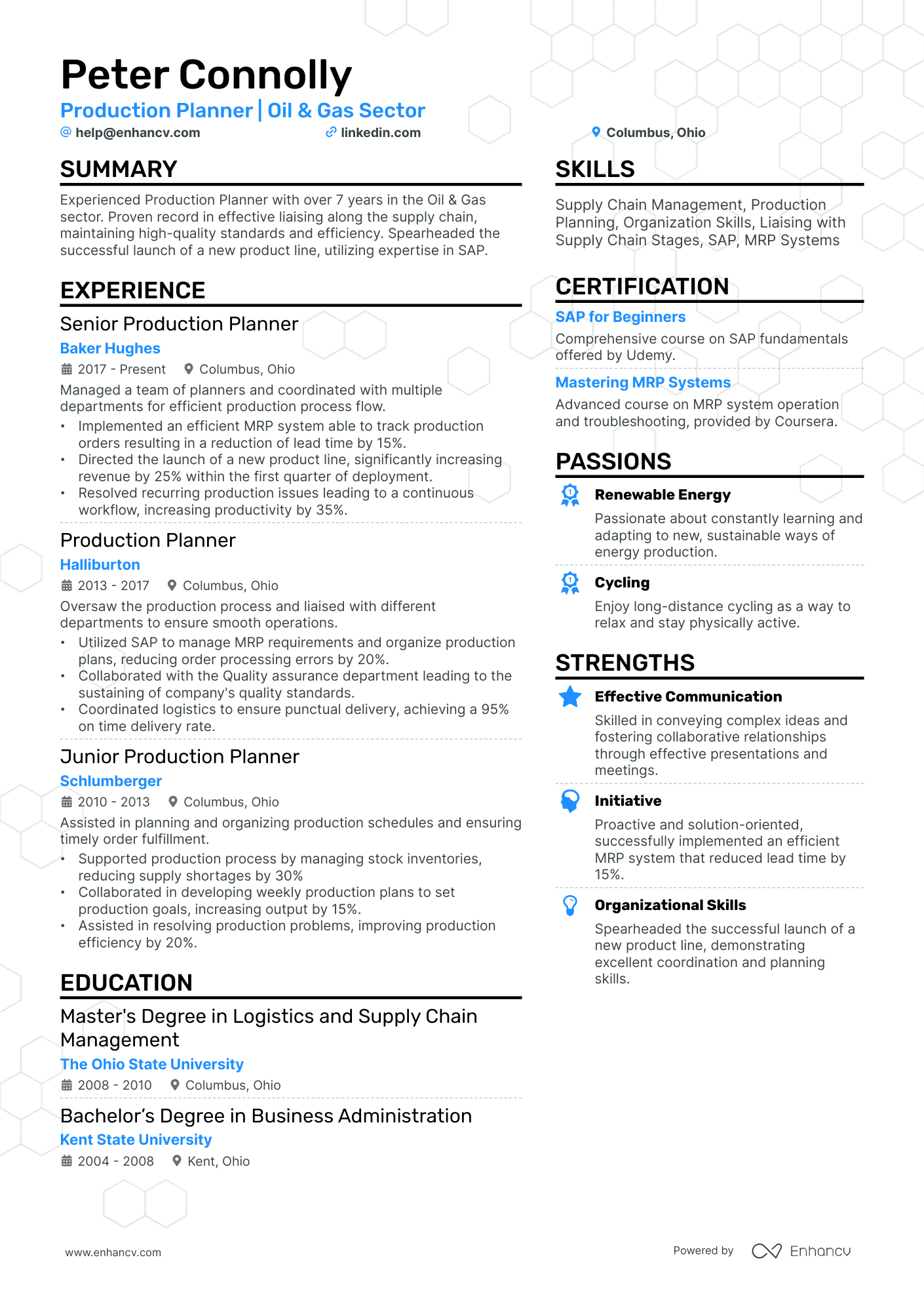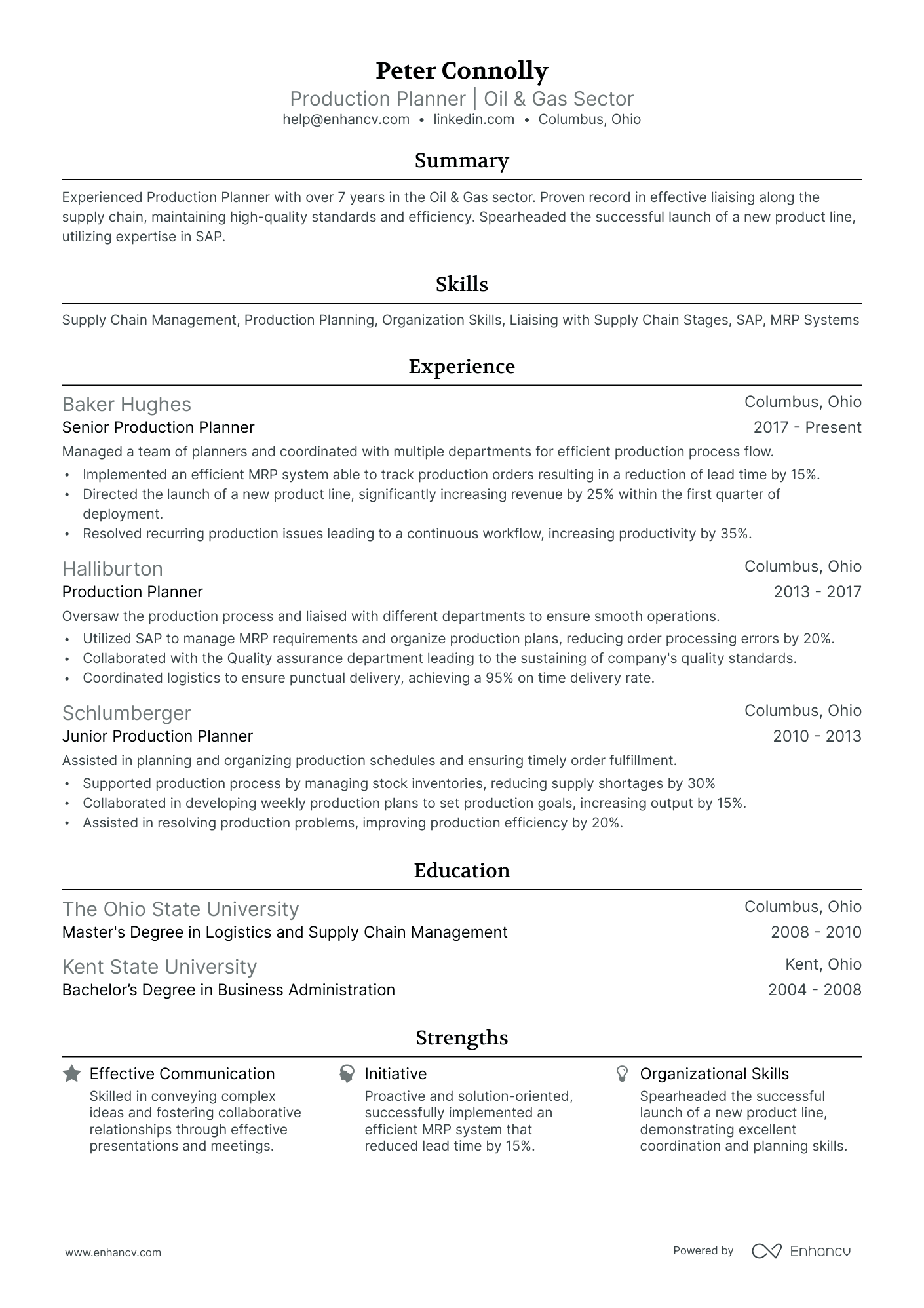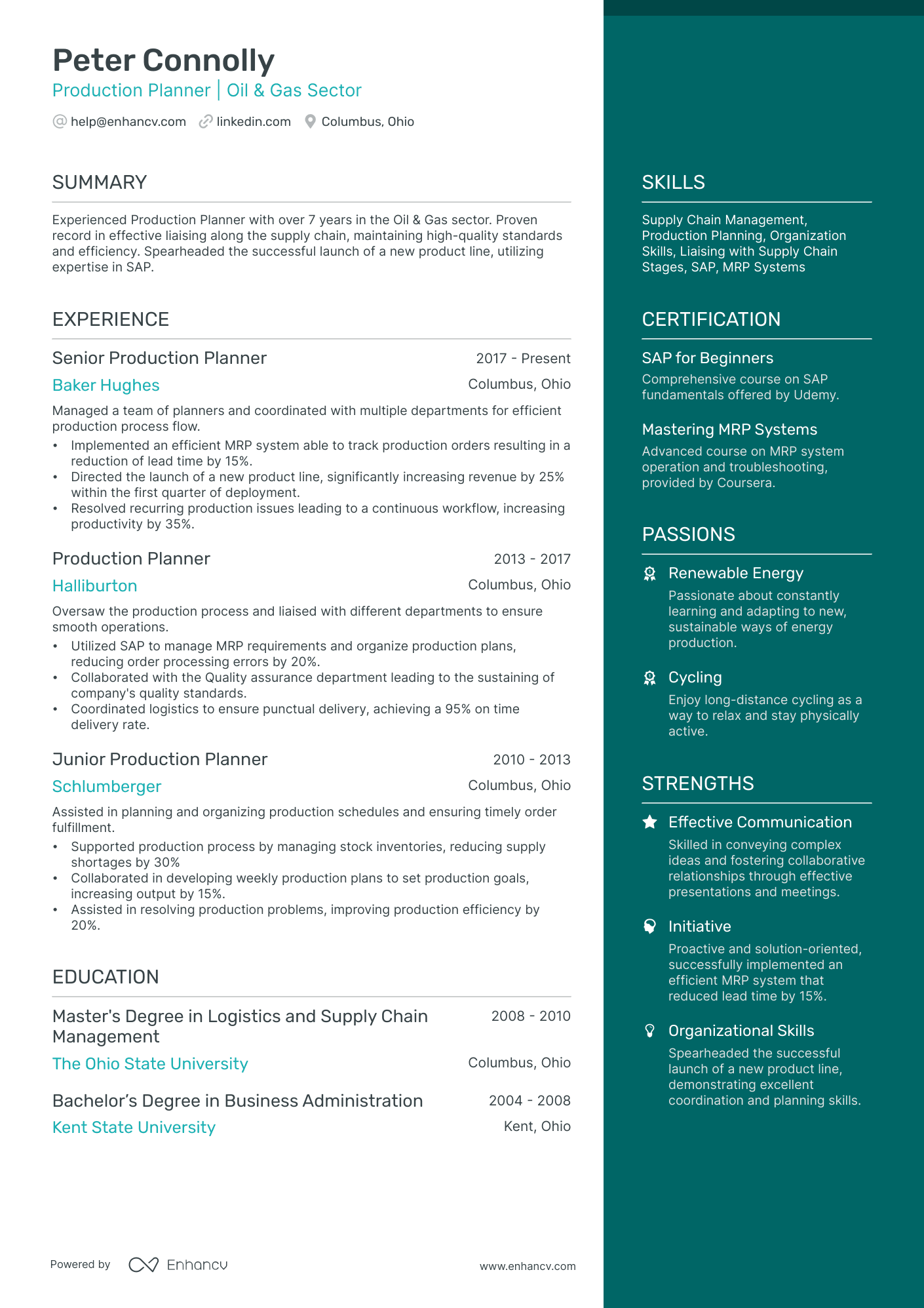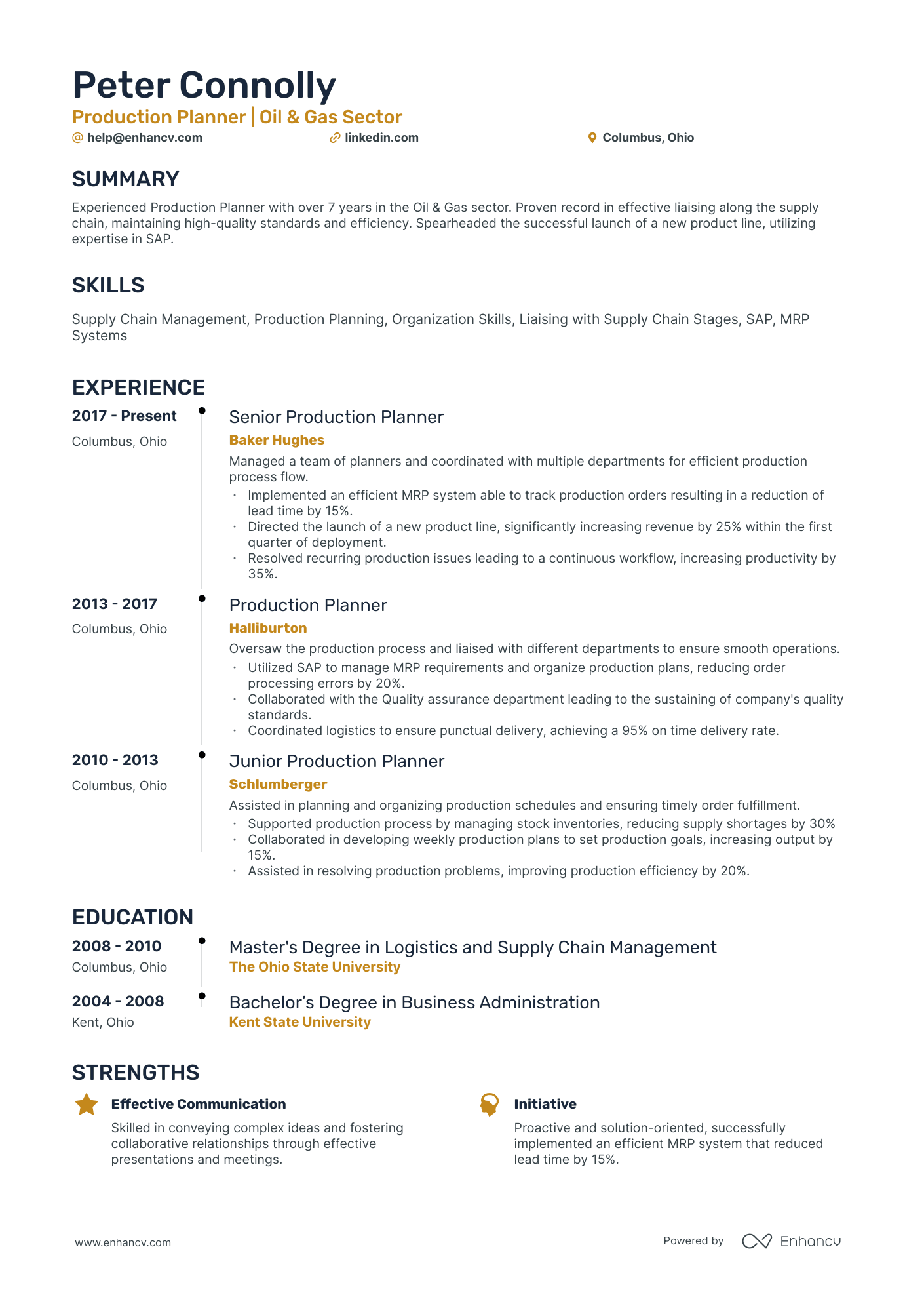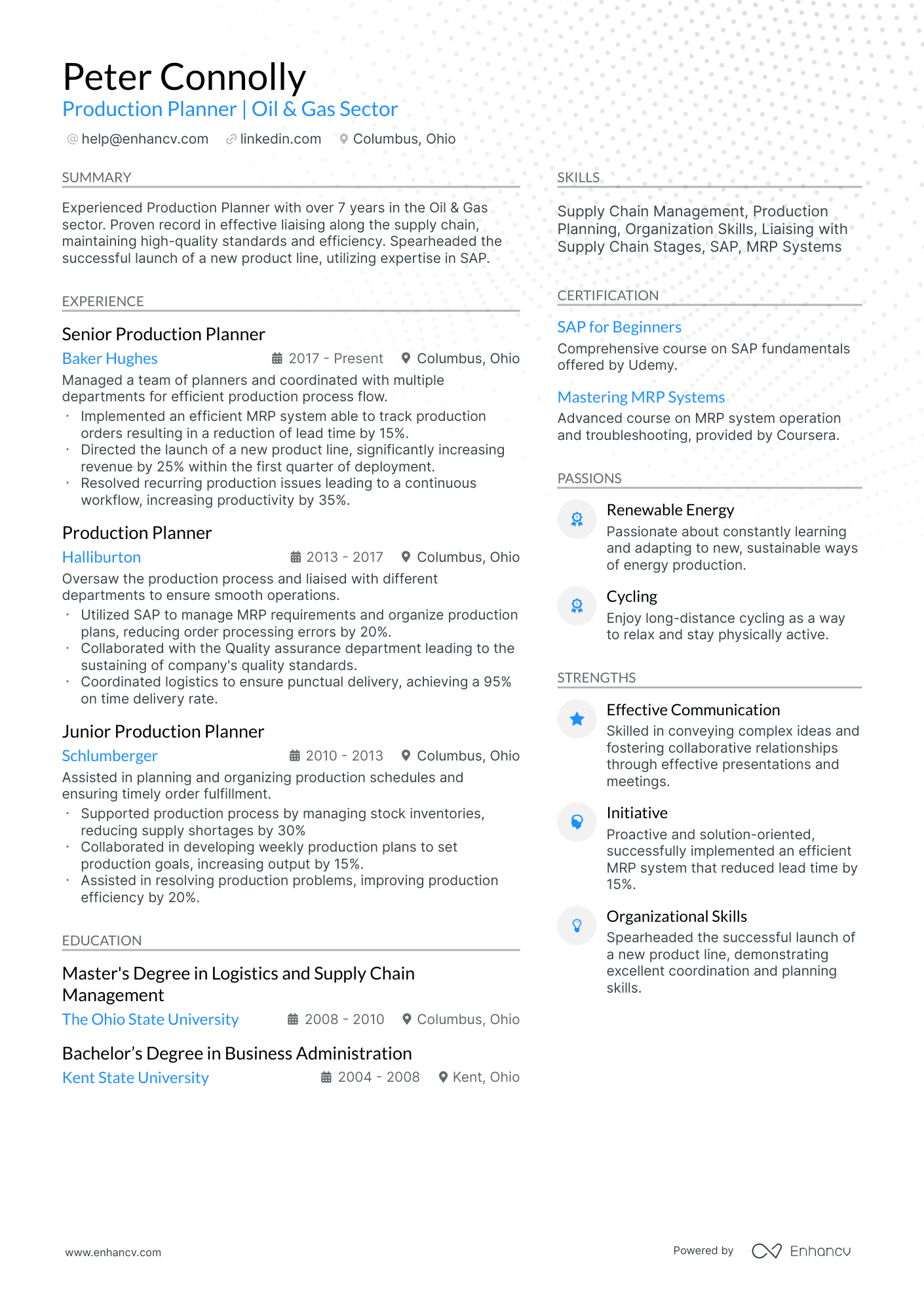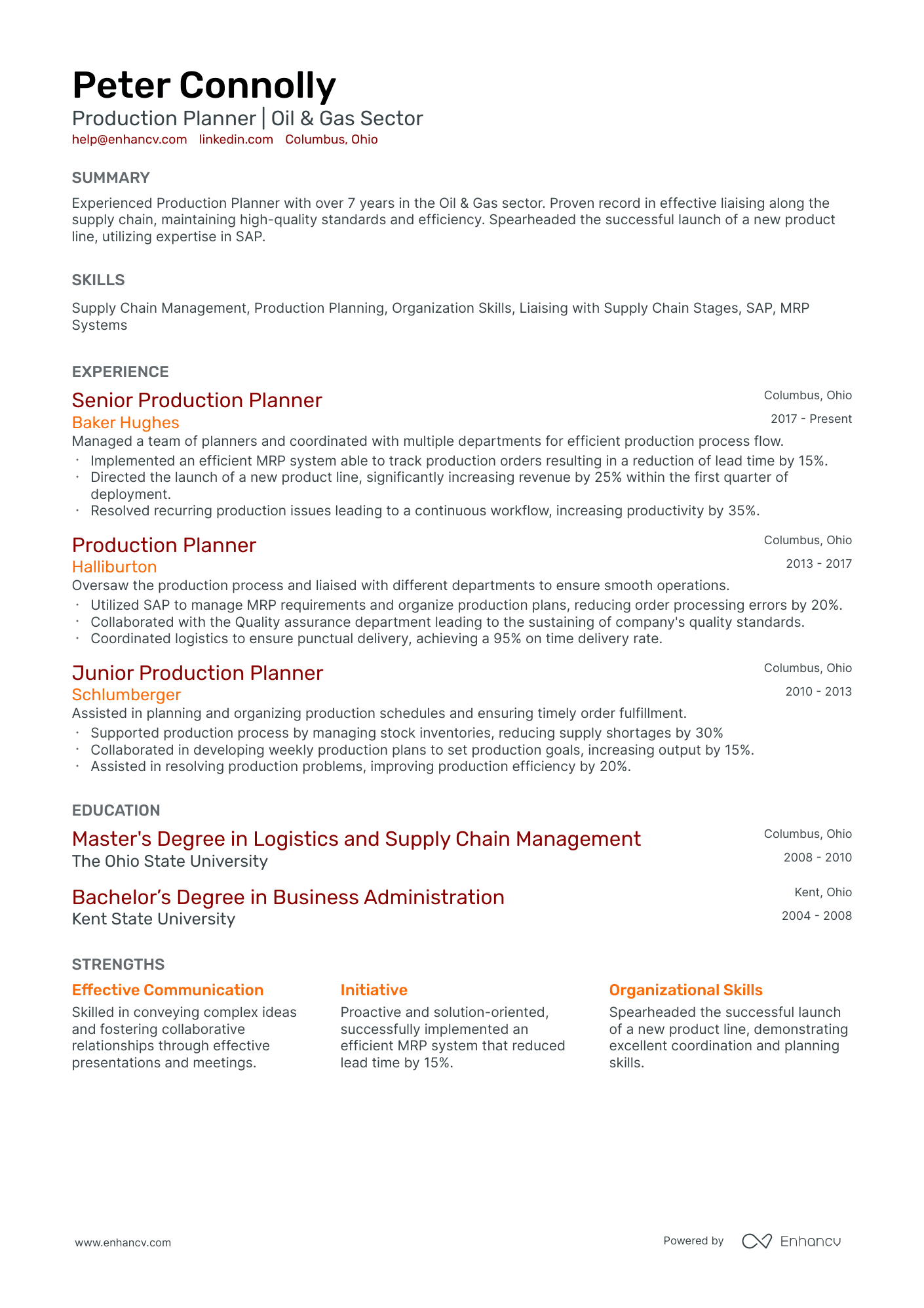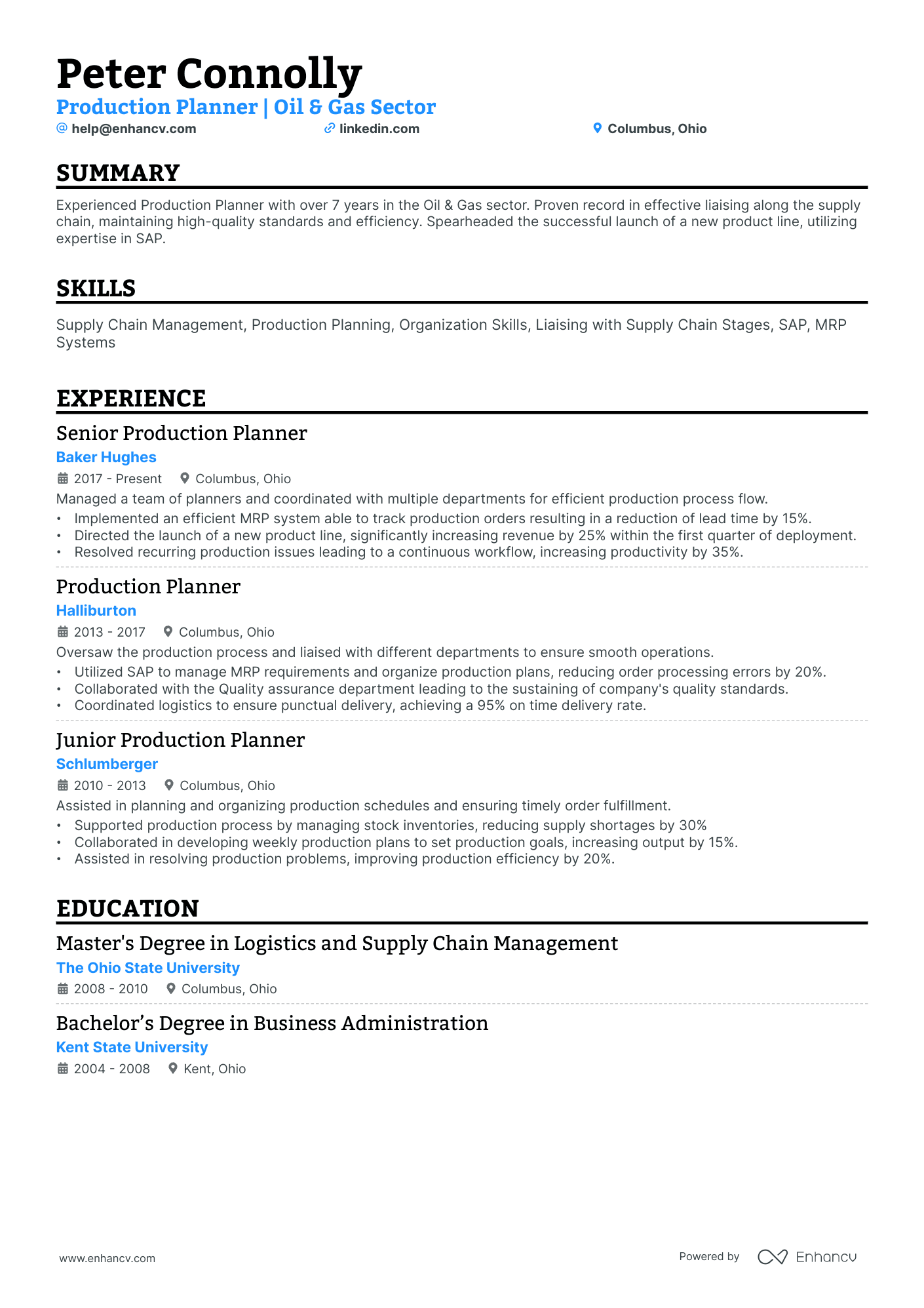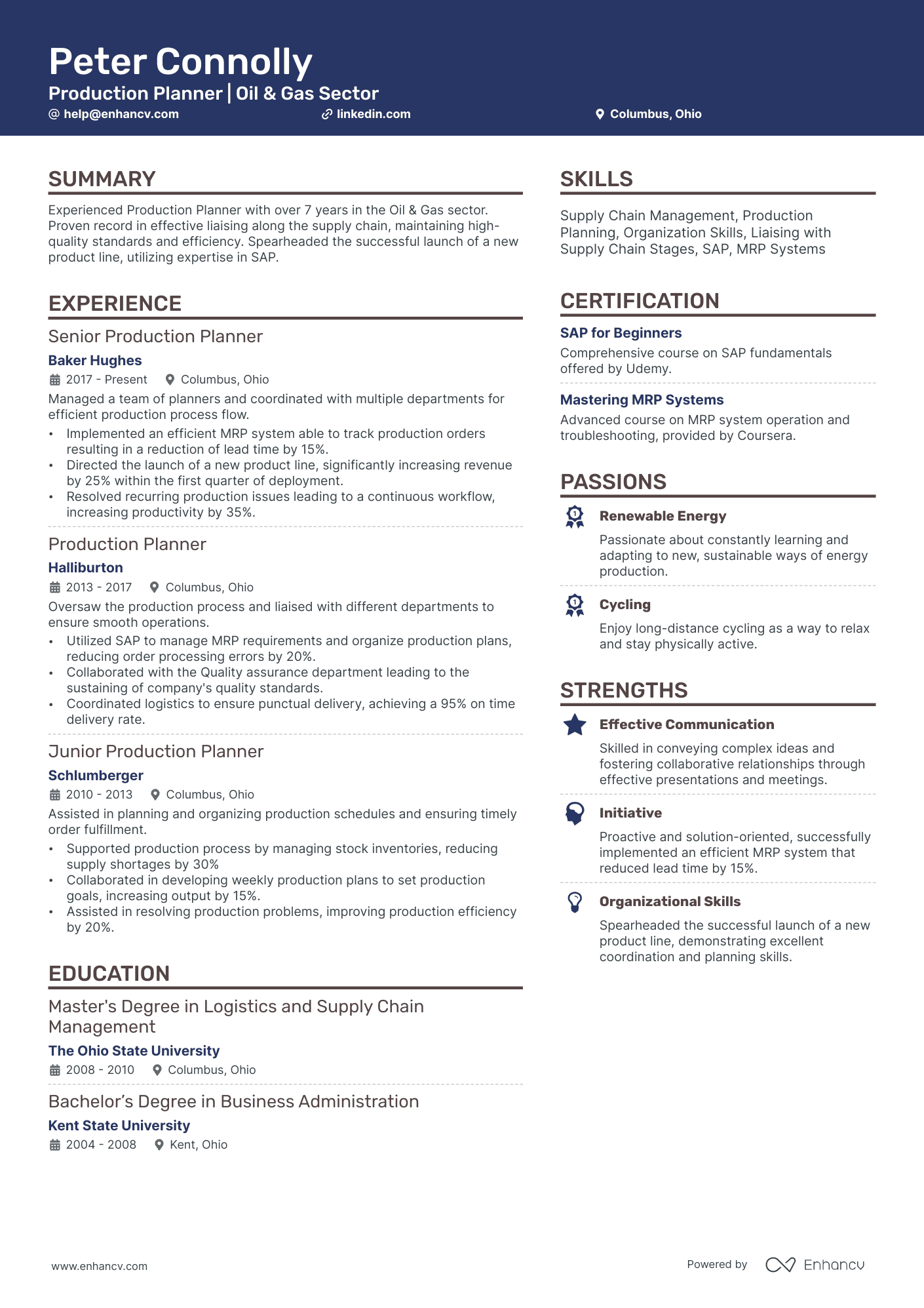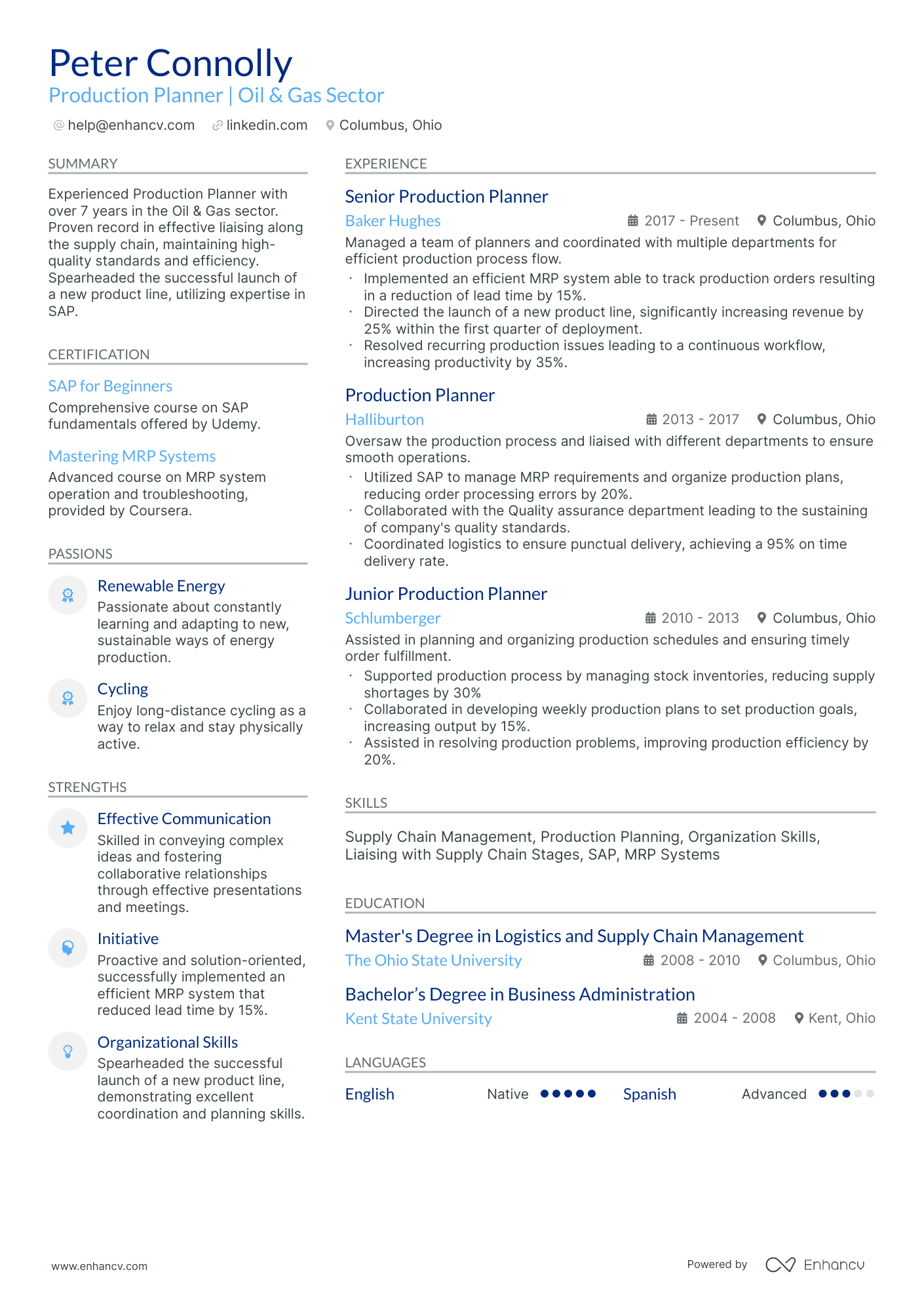One common challenge for production planners is effectively showcasing their ability to coordinate and synchronize multiple production processes in a succinct and impactful manner on their resume. Our guide provides detailed examples and industry-specific templates that can help you highlight these complex responsibilities, making your resume stand out to potential employers.
Dive into our concise guide to learn how to:
- Show your production planner career's brightest moments through your resume's summary, objective, and experience sections.
- Explore top-notch production planner resume examples to understand how to distinguish yourself from other candidates.
- Identify the most sought-after production planner skills and certifications in the industry.
- Design a structured yet unique resume layout.
Recommended reads:
Deciphering the best format for your production planner resume
To craft an impactful production planner resume, start by thoroughly analyzing the job description.
Your chosen resume format should seamlessly align your experience with the role's requirements.
Consider these four pivotal elements:
- Present your experience effectively. If you boast a wealth of pertinent experience, employ the reverse-chronological resume format, listing roles by date, beginning with the most recent.
- Maintain brevity. Limit your resume to a maximum of two pages, focusing on your most salient attributes.
- Headers serve a purpose. A well-crafted header ensures recruiters can swiftly access your contact details and professional portfolio.
- Opt for PDF. Typically, submit your production planner resume in PDF to preserve its layout. However, always adhere to specific job application guidelines.
Remember, resume layouts can vary by country – for example, a Canadian resume format could look different.
Upload your resume
Drop your resume here or choose a file. PDF & DOCX only. Max 2MB file size.
Pro tip
While color can enhance your production planner resume by emphasizing key details like headlines, job titles, and degrees, moderation is key. Stick to a primary and a secondary color to maintain professionalism and avoid a cluttered appearance.
To craft a compelling technical consultant resume, focus on these sections:
- A scannable header
- A snapshot of your professional persona, showcasing soft skills, achievements, and a summary or objective
- Skills that align with the job advert
- Quantifiable achievements in your experience section
- An education and technical skills section that underscores your proficiency with specific tools or software
What recruiters want to see on your resume:
- Experience with production planning software and ERP systems
- Demonstrated ability to interpret and analyze production data
- Strong understanding of supply chain logistics and inventory management
- Evidence of problem-solving skills, particularly in dealing with production issues
- A history of collaboration with cross-functional teams to ensure production goals are met effectively
Recommended reads:
Optimizing the experience section of your production planner resume
The experience section is pivotal—it bridges the gap between your qualifications and the job's requirements.
To craft an impactful production planner experience section, consider these guidelines:
- Review the job posting to identify key requirements and align your past roles with these needs.
- Go beyond listing skills—demonstrate their impact through quantifiable achievements.
- Exclude roles that don't enhance your application or showcase relevant skills.
- While technical expertise is crucial, also highlight soft skills that add value to your role.
- Use action verbs to articulate your accomplishments and the skills employed to achieve them.
Below, we've provided production planner resume samples to inspire your experience section, ensuring it adheres to industry best practices.
- Developed production schedules and coordinated with cross-functional teams to ensure timely delivery of products.
- Implemented a new inventory management system, resulting in a 20% reduction in material waste.
- Led cost-saving initiatives by optimizing production processes, reducing overall manufacturing expenses by 15%.
- Collaborated with suppliers to manage raw material availability and mitigate potential production disruptions.
- Utilized ERP software to forecast demand and adjust production schedules accordingly, improving on-time delivery by 25%.
- Streamlined production workflows, resulting in a 30% increase in output while maintaining quality standards.
- Coordinated with engineering teams to introduce lean manufacturing principles, reducing lead time by 40%.
- Managed a team of production coordinators, overseeing scheduling and resource allocation for multiple product lines.
- Implemented performance tracking metrics, leading to a 10% improvement in production efficiency.
- Collaborated with sales and marketing teams to develop accurate production forecasts, ensuring optimal inventory levels.
- Identified bottlenecks in the production process and implemented corrective actions, increasing throughput by 15%.
- Led a cross-functional team to successfully launch a new product line, resulting in a 25% increase in revenue.
- Implemented capacity planning strategies, aligning production capabilities with customer demand.
- Developed and maintained production documentation and standard operating procedures to ensure process consistency.
- Led continuous improvement initiatives, resulting in a 20% reduction in production cycle time.
- Collaborated with suppliers to negotiate favorable pricing agreements, reducing material costs by 10%.
- Optimized production schedules using advanced planning software, achieving a 95% on-time delivery rate.
- Implemented automated reporting systems, improving data accuracy and reducing manual effort by 50%.
- Monitored production performance metrics and identified areas for improvement, resulting in a 15% increase in overall equipment efficiency.
- Coordinated with logistics teams to optimize transportation routes, reducing delivery lead times by 20%.
- Assisted in the implementation of a new ERP system, streamlining production planning processes.
- Develop strategic production plans based on demand forecasts and capacity constraints.
- Collaborate with cross-functional teams to resolve production issues and meet customer delivery requirements.
- Implement supply chain optimization initiatives, resulting in a 10% reduction in lead times.
- Analyzed production data to identify bottlenecks and implemented process improvements, increasing overall efficiency by 20%.
- Managed production schedules for multiple product lines, ensuring on-time delivery with a 98% fulfillment rate.
- Led a team of production coordinators and provided training on production planning best practices.
- Collaborated with R&D teams to introduce new products into the production schedule, meeting market demand.
- Implemented inventory control measures, reducing stockouts by 30% and improving order fulfillment.
- Led cross-functional projects to optimize production layouts and reduce material handling time by 25%.
The following content includes information from "O*NET OnLine" by the U.S. Department of Labor, Employment and Training Administration (USDOL/ETA). Used under the CC BY 4.0 license. The data represents the top responsibilities present on the task lists for production planner professionals.
Top Responsibilities for Production Planner:
- Maintain and develop positive business relationships with a customer's key personnel involved in, or directly relevant to, a logistics activity.
- Develop an understanding of customers' needs and take actions to ensure that such needs are met.
- Manage subcontractor activities, reviewing proposals, developing performance specifications, and serving as liaisons between subcontractors and organizations.
- Develop proposals that include documentation for estimates.
- Review logistics performance with customers against targets, benchmarks, and service agreements.
- Direct availability and allocation of materials, supplies, and finished products.
- Redesign the movement of goods to maximize value and minimize costs.
- Explain proposed solutions to customers, management, or other interested parties through written proposals and oral presentations.
- Direct team activities, establishing task priorities, scheduling and tracking work assignments, providing guidance, and ensuring the availability of resources.
- Perform managerial duties such as hiring and training employees and overseeing facility needs or requirements.
Quantifying impact on your resume
<ul>
Writing your production planner experience section without any real-world experience
Professionals, lacking experience, here's how to kick-start your production planner career:
- Substitute experience with relevant knowledge and skills, vital for the production planner role
- Highlight any relevant certifications and education - to showcase that you have the relevant technical training for the job
- Definitely include a professional portfolio of your work so far that could include university projects or ones you've done in your free time
- Have a big focus on your transferable skills to answer what further value you'd bring about as a candidate for the production planner job
- Include an objective to highlight how you see your professional growth, as part of the company
Recommended reads:
Pro tip
The experience section is all about relevancy to the production planner role. Decide on items that will show your expertise and skills in the best possible light.
Highlighting your production planner skills
Recruiters look for a mix of technical and personal skills in your production planner resume.
Technical or hard skills are specific tools or software you use for the job. They're easy to spot through your education and work achievements.
On the other hand, soft skills like communication or adaptability show how you work with others. They come from both your personal and work life.
To showcase your skills:
- Have a skills section for technical abilities and another for personal strengths.
- Be clear about your skills. Name the exact tools you use and describe how you've used your soft skills.
- Avoid common terms like "Microsoft Office" unless the job specifically asks for them.
- Choose up to ten key skills and organize them in different sections of your resume.
Make your resume pop with top technical and personal skills that recruiters value.
Top skills for your production planner resume:
ERP Software (e.g., SAP, Oracle)
MRP Systems
Excel Advanced Functions
Production Scheduling Software
Inventory Management Tools
Data Analysis Tools (e.g., Tableau, Power BI)
Supply Chain Management Software
Forecasting Tools
Lean Manufacturing Principles
Quality Control Techniques
Problem Solving
Communication Skills
Time Management
Team Collaboration
Attention to Detail
Analytical Thinking
Adaptability
Decision Making
Negotiation Skills
Organizational Skills
Next, you will find information on the top technologies for production planner professonals from "O*NET OnLine" by the U.S. Department of Labor, Employment and Training Administration (USDOL/ETA). Used under the CC BY 4.0 license.
Top technologies for Production Planner’s resume:
- Microsoft Dynamics
- SAP software
- Microsoft PowerPoint
- Microsoft SQL Server
- Structured query language SQL
Pro tip
When detailing your skills, align them with the job's requirements. Emphasize unique technical proficiencies and provide examples of your soft skills in action.
Detailing your education and top production planner certifications on your resume
Your education section can reflect a variety of skills and experiences relevant to the position.
- List post-secondary qualifications, noting the institution and duration.
- If you're currently studying, mention your expected graduation date.
- Exclude qualifications unrelated to the role or industry.
- If relevant, delve into your educational background, especially if it was research-intensive.
Including both relevant education and certifications on your production planner resume can set you apart. It not only showcases your qualifications but also your commitment to the profession.
When listing these on your production planner resume, make sure to:
- Highlight degrees and certificates relevant to the role.
- Mention the awarding institution for credibility.
- Include the start and end dates, or if the education/certification is ongoing.
- If relevant, incorporate a few keywords from the job advert within the description of the certification or degree.
If you have additional certifications not directly related to the role, consider placing them towards the end of your resume. This way, they can be viewed as personal interests rather than core qualifications.
For a quick update, check out our list of popular production planner certifications curated by the Enhancv team.
Best certifications to list on your resume
Pro tip
If you're in the process of obtaining your certificate or degree, list the expected date you're supposed to graduate or be certified.
Recommended reads:
Should you add a summary or objective to your production planner resume?
Choose between:
- Resume summary to match job needs with your top wins.
- Resume objective to share your career goals.
Both should tell recruiters about your best moments. Keep them short, around five sentences. Check out our sample structures for guidance.
Resume summary and objective examples for a production planner resume
- Experienced production planner with over 10 years in the manufacturing field, dedicated to optimizing production workflow. Adept at Lean Six Sigma methodologies, consistently meeting deadlines and reducing waste by up to 30%. Proficient in utilizing advanced ERP systems to streamline operations.
- Detail-oriented Operations Manager with a background in logistics transitioning into Production Planning. Bringing to bear 8 years of process optimization and team leadership experience, aiming to employ robust planning skills to enhance productivity within a manufacturing environment.
- Strategic analyst with 5 years in supply chain management now seeking a role as a production planner. Equipped with an MBA and a strong understanding of cost-efficient procurement strategies, looking forward to applying this knowledge to reduce production costs and improve efficiency.
- Accomplished Manufacturing Engineer with 7 years' experience, skilled in lean manufacturing and statistical quality control, transitioning to Production Planning. Demonstrated ability to decrease downtime by 20% and increase output by 15%, seeking opportunities to utilize these skills extensively.
- Pursuing a career as a production planner, bringing a recent degree in Industrial Engineering and an internship experience in lean manufacturing practices. Intent on leveraging proven analytical and problem-solving skills to enhance operational efficiency and meet project deadlines.
- Hardworking and organized graduate focusing on securing a position as a production planner. Armed with a Bachelor’s in Business Administration and a keen understanding of supply chain management, eager to contribute towards optimizing production scheduling and inventory management processes.
Optimize your resume summary and objective for ATS
Drop your resume here or choose a file.
PDF & DOCX only. Max 2MB file size.
Extra sections to boost your production planner resume
Recruiters love candidates who offer more. Share your personality or extra industry credentials. Consider adding:
- Projects showcasing standout work.
- Top awards or recognitions.
- Relevant publications.
- Hobbies and interests that reveal more about you.
Key takeaways
- Craft a production planner resume that's easy to read and aligns with the role's requirements.
- The top third of your resume should clearly convey your unique value proposition for the production planner role.
- Tailor your resume to the job, highlighting skills, achievements, and the tangible results of your efforts.
- Detail your certifications and technical skills to demonstrate proficiency with specific tools and technologies.
- The sections you choose should collectively present a comprehensive view of your professional expertise and personality.
